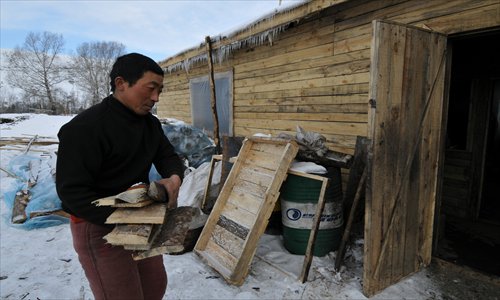HOME >> WORLD
Migrant worker woes
By Liu Yunlong Source:Global Times Published: 2013-9-4 23:38:01

A Chinese man is carrying firewood to a dormitory where migrants from China live in Khakassia, Russia in February. Photo: CFP
Every morning, Li Qiutian gets up early to tend to his vegetables in the greenhouses near the Ural Mountains in Russia.
Li has been in Russia since 2005, when he decided to leave his home in Liaoning Province.
"We work harder than Russians. Sometimes, I work from 5:00 in the morning until 10:00 at night," said Li.
"We plant different vegetables in greenhouses and transport them to the local market," said Li, adding that local people have mixed feelings toward him.
Li said that he sometimes has the feeling of being in exile and misses home. "Every year, I go back home to celebrate Spring Festival with my family."
Li told the Global Times that there are several hundred Chinese farmers growing vegetables where he stays.
Narrowing the door
However, recent immigration policies regarding foreign residents have made Li and his compatriots feel less than welcome in Russia.
Earlier in August, around 600 Chinese who grow vegetables in Krasnodar Krai were deported, with the local internal affairs officer saying that they didn't have legal migrant visas and were illegally growing vegetables.
Experts said that Russia is narrowing its doors to foreign workers by tightening its visa system and cutting migrant worker quotas.
"Some could get the working visas while some couldn't, as the number is very limited," said Li, adding that each visa would cost around 8,000 yuan($1300).
"It is difficult living here," said Zheng Dehua, a young farmer from Heilongjiang Province who has been in Russia for five years, farming lands in Birobidzhan, a small Russian town bordering Northeast China. "We sign contracts with the local government and plant crops in leased land."
"Most Chinese farmers here have visas," said Zheng, but noting that a visa costs around 8,000 yuan every year for extension and requires an invitation from Russia.
"The Russian government has set many barriers for migrants with tricky visa application procedures and limited labor visas. This prevents migrant workers from entering Russia, but doesn't match the huge labor market in the country," Wang Lijiu, a research fellow of Russian studies at the China Institute of Contemporary International Relations, told the Global Times.
As an example, he says that the visa application usually requires several months, which is too long to allow workers to take job opportunities.
Russia's immigration policy is unreasonable and contradictory, according to Wang, as it seeks to exclude migrant workers, despite the country having a shortage of laborers.
Absence of Chinatowns
"We live separately and don't limit our activities to the Chinese circle," said Zheng, when asked whether he and his fellow countrymen would gather together, which has been a common trait of overseas Chinese.
Since the late Qing Dynasty(1644-1911), millions of Chinese have gone overseas, running businesses and working as migrant workers. These overseas Chinese always gathered together and formed a Chinatown, a relatively closed community where they communicate in their native language and preserve Chinese traditions.
However, if you walk around any city in Russia, you would be hard pressed to find any Chinatown.
Earlier in August, the Secretary of Russia's Ministry of Regional Development, Alexander Zurawski, said in a meeting focusing on immigration policy that the establishment of ethnic villages in the form of Chinatowns by Chinese migrants was forbidden according to local regulations.
"In consideration of Russian reality and social security, the country has always advocated a mixing-together policy with regards to the foreign population," said Wang. "They are very vigilant toward closed communities with a single ethnic group living there, as they believe it might give them political power, posing a threat to the country."
"As far as I know, there is no Chinatown in Irkutsk. Chinese don't live together and are scattered around different areas in the city," Zhu Lei, a student who previously studied in Irkutsk, the largest Russian city in the Siberia, told the Global Times.
Li told us that he and his compatriots would usually gather together, but have no intention of forming a community, saying that they also like to communicate with locals.
"My two neighbors are very good to me, and I like talking with them," said Li.
"Chinese migrants are also trying to adapt to the local policy. When they found that it was troublesome to assemble, they chose to live scattered," said Wang, noting that Chinese migrants respect local regulations.
Hyping the issue
Experts said that historically, Russia has never been an immigrant country, making it very wary of the foreign population.
Russian media's hyping of the "Chinese migration threat" has encouraged discrimination toward Chinese migrants, according to Chen Yurong, director of the Department for European-Central Asian Studies at the China Institute of International Studies.
The idea prompts worries that a large number of Chinese migrant workers will rush into Far East area, "stealing" jobs from the local laborers.
"Unlike what the media says, there are not that many Chinese migrants in the Far East," said Chen, "and most Chinese migrants do jobs that Russia's young people don't want to do, such as selling goods in markets and doing farm work in cold rural areas."
"Compared to a decade ago, Russia has become less attractive," said Chen, adding that living standards in Russia are not that high while China's rapid development has created a better environment and great opportunities.
She said there are many people in Russia who are worried about the labor shortage crisis in rural areas, as fewer migrants are willing to work in Russia.
Posted in: Asia-Pacific